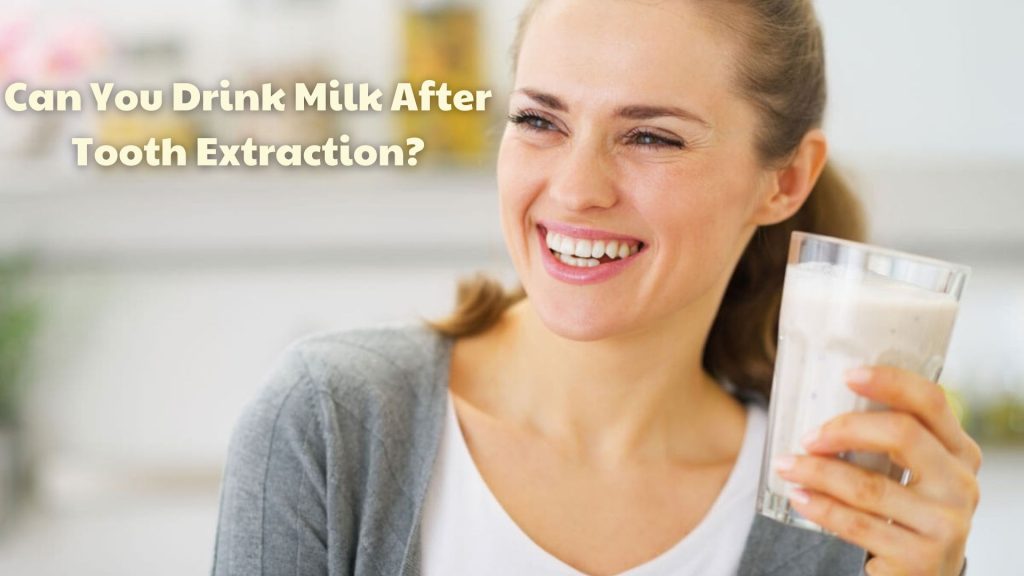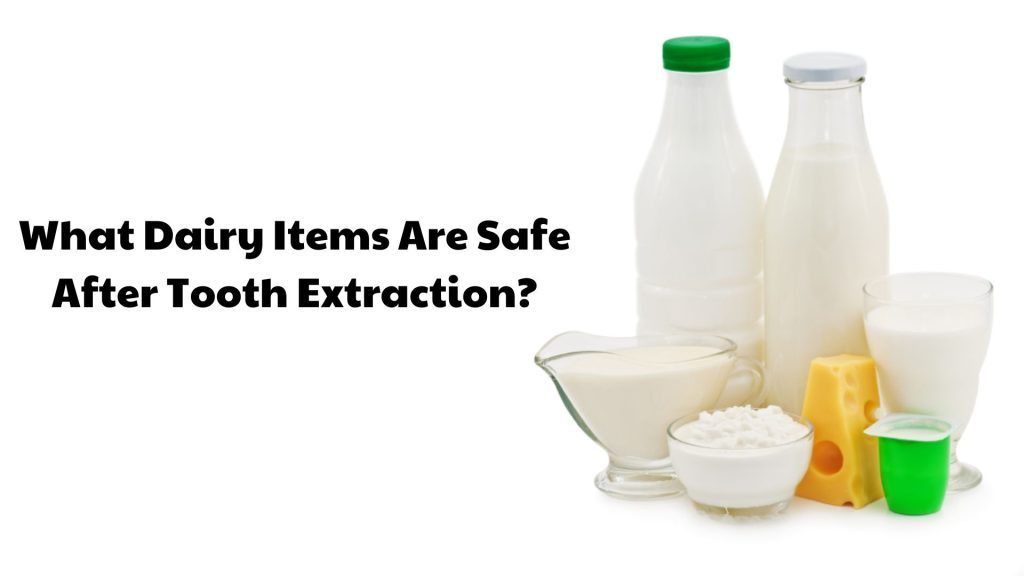Why no dairy after tooth extraction? Milk includes lactose, which may cause indigestion, and infection, and impede healing following tooth extraction. To maintain health and comfort, we must recover quickly after extraction. Diet is crucial to recovering following tooth extraction. After tooth extraction, minimize milk and dairy items. After getting a tooth out, why not just sip some milk? Discover why in this article.
Can You Drink Milk After Tooth Extraction?

Each situation and the orthodontist’s guidelines determine whether to consume milk after tooth extraction. But, drinking milk after tooth extraction might slow recovery in certain circumstances. If you had a tooth pulled without surgery and don’t have pain or stomach problems, milk can be a good way to get extra nutrients and keep your body healthy. Calcium and vitamin D are essential. However, if you have had a tooth taken surgically or have an inflammatory condition, you should avoid consuming milk throughout the healing time. Lactose sensitivity prevents some individuals from digesting milk’s lactose. Drinking milk may induce diarrhea, indigestion, or pain. Additionally, the tooth extraction site is exposed to microorganisms. Bacteria may infect and slow healing if you don’t brush after drinking milk.
What Dairy Items Are Safe After Tooth Extraction?

If you don’t have inflammation or digestive issues, you may take dairy products after tooth extraction. However, consult your dentist and doctor before using certain dairy products. Try these dairy items after tooth extraction:
- Yogurt: If you can tolerate lactose, try yogurt. It offers nutrients, including digestive microorganisms.
- Condensed milk: Sugar and milk proteins make condensed milk great for digestible dishes.
- Nut milk: Almond, walnut, sunflower seed, and pea milk are lactose-free and nutritious.
- Low Shea Milk: Choose low-fat dairy from animals.
- Lactose-free milk: Many manufacturers provide lactose-free milk for lactose sensitivity. So, check the label.
Before consuming dairy products following a tooth extraction, check with your orthodontist to be sure your recuperation and customization won’t be affected. Your diet is appropriate.
Why No Dairy After Tooth Extraction?

According to The United States National Library of Medicine, after a tooth is pulled, the healing process is important to make sure the wound heals well and no problems arise. Here’s how dairy affects tooth extraction recovery:
- Effects of Lactose: Lactose, milk’s natural sugar, may cause lactose intolerance in certain individuals. After tooth extraction, the body has trouble absorbing nutrients, thus drinking milk might slow healing.
- Risk of infection: The tooth’s recessed region is accessible to microorganisms. Milk is a good place for bacteria to grow. After drinking milk, germs may cause illness and slow recovery.
- Effect of temperature: Too hot or cold milk might injure the retracted teeth. Extreme heat shrinks and swells wounds, causing discomfort and poor recovery.
- Chemical ingredients: Certain dairy products may aggravate and damage wounds due to the presence of chemicals, preservatives, and additives.
- Gastrointestinal disorders: Surgery may impact proximal muscles and digestion after tooth extraction. Milk may make you sick.
Should You Drink Milk After Tooth Extraction?
Take these precautions if you mistakenly consume milk following tooth extraction: Rinse mouth: After consuming milk, rinse your mouth with salt water or filtered water. Mouthwash prevents milk from touching the tooth extraction site.
- Do not use cold or hot milk: To minimize damage to the tooth extraction site, consume room-temperature milk instead of cold or hot milk.
- Avoid using other dairy products: Besides milk, avoid ice cream, condensed milk, yogurt, and cheese following tooth extraction.
- Monitor oral health status: Note oral health after milk. If you have any unexpected symptoms, call your orthodontist immediately.
- Dental checkups: Tell your dentists you drank milk after the extraction during your post-extraction checkup. Your dentists will assess the effects of milk on the tooth extraction site and provide you with recommendations.
In short, always see your orthodontist if you have any concerns about recovering after tooth extraction.
Advice On Drinking Milk After Tooth Extraction

Here are some things to keep in mind if you wish to drink milk after getting a tooth pulled:
- Consult with a maxillofacial doctor: Before drinking milk after tooth extraction, visit your orthodontist. Your doctor will decide whether you can drink milk.
- Check oral health: Make sure the tooth extraction site isn’t bleeding or infected. If there is an injury, don’t use milk until it heals.
- Opt for lactose-free milk (as the case may be): To prevent diarrhea and discomfort, try lactose-free milk or dairy products.
- Temperature control: Don’t drink hot or cold milk. Heat may harm the extraction site and create pain.
- Alternative drinks: Water, salt water, unsweetened fruit juice, or genuine milk are good alternatives to milk following tooth extraction. Almond, soy, and coconut milk are lactose-free.
When considering drinking milk following a tooth extraction, your doctor’s recommendations and medical condition are most significant. To recuperate safely, follow your doctor’s directions.
Replace Milk With Other Beverages
Your recuperation after tooth extraction will go more smoothly if you give careful consideration to the liquids and meals you consume during this time. Here are some alternatives to milk that you may enjoy after having teeth pulled:
- Water: Filtered water is a good choice to keep your body hydrated during recovery. Drink enough water to stay hydrated.
- Unsweetened fruit juice: Milk substitutes include unsweetened fresh fruit juice. Vitamins and antioxidants in fruits boost immunity.
- Protein-rich drinks: A protein-rich, readily digested drink like soy or pomegranate juice can assist in recuperation and wellness.
- Soft greens: For vitamins and antioxidants, prepare spinach, turnips, and carrots.
In short, when picking dairy substitutes for your recovery food, talk with your dentists or nutritionist to ensure you’re receiving enough nutrients.
Conclusion
We all have to have teeth pulled at some point in our life. After tooth extraction, appropriate care and following regulations are needed to speed up healing. In this post, we learned why milk should not be taken after tooth extraction and its harmful effects on recovery. At Spring Orchid Dental, the patient’s well-being and convenience are prioritized above everything else. We want everyone to understand why milk shouldn’t be used following tooth extraction to guarantee a smooth recovery. Also, at Spring Orchid dental clinic, we provide the greatest guidance and expert treatment to help you safely and successfully recover after your extraction. Trust our expertise and call us if you need help. We will help you recover after tooth extraction.
FAQs
Why Could Tooth Extraction Exacerbate Lactose Intolerance?
Yes, tooth extraction may worsen lactose intolerance: Effects of anesthesia: Anaesthetics help dentists remove teeth. Lactose might worsen stomach issues with certain anesthetics.
- Digestive disorders after surgery: Minor extraction surgery might impact the digestive system and create digestive issues. Digestive issues make lactose consumption harder.
- Nutrient and water deficiency: After tooth extraction, food and water intake might drop, causing lactose deficiency.
- Use of antibiotics: Antibiotics used to treat an infection following tooth extraction may harm gut flora, causing digestive issues and increasing the chance of tooth extraction.
In conclusion, anesthesia, postoperative gastrointestinal problems, food and hydration deficits, and medications may aggravate lactose intolerance following tooth extraction. After tooth extraction, speak to your doctor about how to manage lactose intolerance and adjust your diet.
How Does Dairy Lactose Influence Digestion During Recovery?
The digestive tract lacks lactase, which breaks down lactose into simple sugars for absorption into the circulation. Therefore, lactose stays intact in the small intestine and is broken down by bacteria. This process creates gases (hydrogen, methane) and breakdown products, generating lactose intolerance symptoms like:
- Discomfort and flatulence.
- Diarrhea.
- Nausea and vomiting.
- Abdominal pain and indigestion.
Lactose-containing dairy items should be avoided or restricted following tooth extraction to assist the digestive system. Instead, pick beverages and foods without lactose or other nutrients to promote a smooth recovery and no digestive issues.
What Nutrients Should Be Prioritized Following Tooth Extraction If Dairy Items Are Avoided?
After extraction, avoid lactose-containing dairy items but receive enough nutrients to recover. Post-tooth extraction diets should prioritize these nutrients:
- Protein: Protein helps repair muscle and bone structure after tooth extraction. Tender meats, fish, eggs, nuts, and legumes are simple to eat.
- Vitamin C: Vitamin C boosts immunity and healing. Oranges, lemons, strawberries, kiwi, and broccoli contain vitamin C.
- Calcium: Bone regeneration and wound healing need calcium. Sunflower seeds, almonds, anchovies, tuna, collard greens, and beans are calcium-rich alternatives to milk.
- Vitamin K: Vitamin K helps blood coagulate and heal. Spinach, collard greens, and kale are vitamin K-rich.
- Water: Drink adequate water throughout the day to keep your body hydrated and help the tooth extraction site recover.
Don’t forget to talk to your oral surgeon or nutritionist about how to best tailor your diet to your unique health needs and recuperation.





